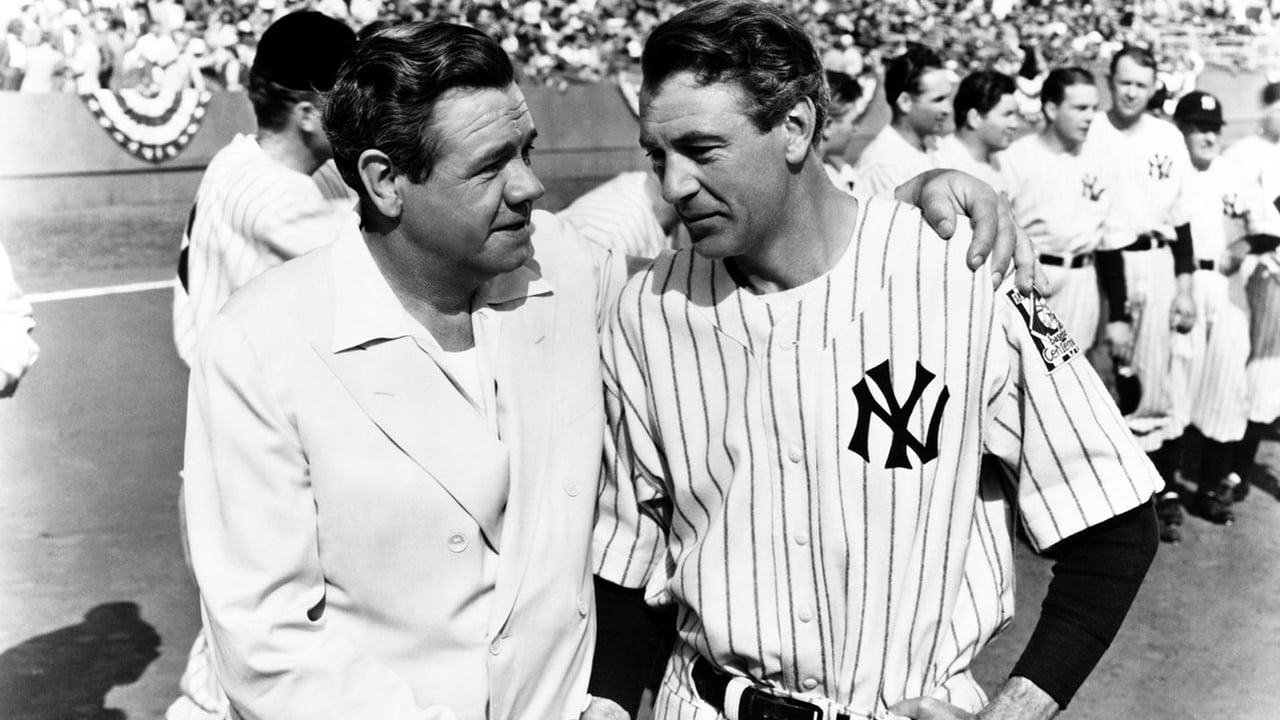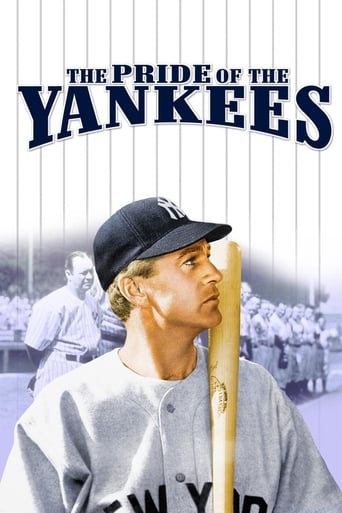

A Major Disappointment
... View Morea film so unique, intoxicating and bizarre that it not only demands another viewing, but is also forgivable as a satirical comedy where the jokes eventually take the back seat.
... View MoreThe film creates a perfect balance between action and depth of basic needs, in the midst of an infertile atmosphere.
... View MoreWhile it is a pity that the story wasn't told with more visual finesse, this is trivial compared to our real-world problems. It takes a good movie to put that into perspective.
... View Morefor all the B-movie sentimentality we do have the incredible, amazing opportunity to watch the great Bambino play himself and do one h*lluva good job! and not just the Babe...many of "Murder's Row", the 1927 (real) Yankees. can't get over that...even after 55 years of loving the movie.Gary Cooper was, as we all know, selected by the fans who chose guess who? had to be Gary Cooper! Here's a little confusion for me: I love Gary and Lou but Gary was, at 40, built like a tennis player and Lou was build like...an Iron Horse. Muscles over muscles. Was there an actor to really play Gehrig? I do not know. Movie historians, please advise. I know how negative that sounds. But Cooper looked awful in uniform.but..to dispel any "confusion"...Gary's beautiful final speech at Yankee Stadium, July of 1939. "Today, I consider myself...". For Americans and Americans only, we cherish that after THe Ghettysburg Address!
... View MoreTHE PRIDE OF THE YANKEES (Samuel Goldwyn/RKO Radio, 1942), directed by Sam Wood, taken from the opening credits underscoring to "Take Me Out to the Ball Game," could very well be a historical account about the New York Yankees. Instead, according to the opening tribute by journalist Damon Runyon, "its the story of Lou Gehrig." (Born Henry Louis Gehrig (1903-1941), one of the greatest baseball players of all time). An original story by Paul Gallico details Lou Gehrig's life, first starting him as a boy (Douglas Croft) of twelve in New York City. He's introduced as a son of German immigrants whose father (Ludwig Stossel) is a janitor and mother (Elsa Janssen), a cook at Columbia University whose ambition is for her son to grow up like their Uncle Otto to become an engineer. Even at an early age, Lou's talent for baseball is proved effective as he bats with the neighborhood kids hitting the ball to a point of smashing a store window at a very far distance, costing his mother to come up with $18.50 to replace it. As a young man working his way through school as a waiter, studying to become an engineer, Lou (Gary Cooper), a baseball athlete for Columbia University, is discovered by sportswriter, Sam Blake (Walter Brennan), who eventually signs him as player for the New York Yankees. Though Mama Gehrig is very much against this, her son's newfound success turns her into a baseball fan. After slipping on a pile of baseball bats in his first game in Chicago, Lou is teasingly called "tanglefoot" by pretty spectator, Eleanor Twitchell (Teresa Wright) seated by her father (Pierre Watkin). Following a brief courtship, they would soon marry. As time progresses with Blake and Hank Hannerman (Dan Duryea) watching and reporting first baseman Gehrig making baseball history from the press box, "The Iron Man" as he would be called, would not only rank along with Babe Ruth (Babe Ruth) as one of the greatest sports figures, but become a true pride of the Yankees. All this would change after Lou faces something that would put an end to his powerful sixteen year career.In one of the finest sports movies ever made, THE PRIDE OF THE YANKEES, became producer Samuel Goldwyn's only biographical film, and one of his most admired. Gary Cooper, having already won his Academy Award as Best Actor playing SERGEANT YORK (Warner Brothers, 1941), an American war hero, gets another home run here by the Academy once again for his portrayal of an American sports hero, Lou Gehrig. Being more of a personal and private life story of Lou Gehrig than on his development as a baseball player, it's all wonderfully told during its 128 minutes. Though historians may find several faults of mention, including a scene or two where Cooper writes or bats right handed rather than Gehrig's oft-mentioned left, or placing few factual characters in the wrong time frame, the acting, the story and direction make up for such errors. With time away from some Yankee game re-enactment, there's time out for humorous moments by Babe Ruth and his baseball buddies, musical entertainment featuring a tango dance from the Moon Terrace Cabaret performed by Veloz an Yolanda as conducted by Ray Noble and his Orchestra. There's also female vocalist on platform singing the classic Irving Berlin tune, "Always," that to become the Gehrig's personal love songAside from Teresa Wright's sensitive portrayal during its second half, and Walter Brennan, sporting glasses and mustache, as the sports writing friend, no scene comes close to Cooper's heartfelt closing speech on that historic Tuesday, July 4th, 1939, day at Yankee Stadium that would not only stay in memory long after the film is over, but prove his Lou Gehrig to be "the luckiest man on the face of the earth."Even if THE PRIDE OF THE YANKEES strays from the truth at times, it's every sports buff's dream to actually get to see such baseball legends of the past portraying themselves, Bill Dickey, Mark Koenig and Robert Meusel. There's no one more recognizable than Babe Ruth at bat on the field, taking part in the story as well. Aside from Ruth having appeared in several motion pictures dating back to the silent era, it's little known fact that Gehrig appeared in a feature length motion picture himself, interestingly a "B" western titled RAWHIDE (20th-Fox, 1938) starring Smith Ballew, (Who?), a bit of trivia not included in the film. Aside from the major actors, others participants worth noting are Virginia Gilmore (Myra Tinsley); Ernie Adams (Miller Huggins), Hardie Albright (Van Tuyl), and sports announcer Bill Stern appearing as himself.THE PRIDE OF THE YANKEES, having been a long time movie favorite on New York City's Yankee station of WPIX TV, Channel 11 (1970-1995), has in later years been shown in the colorized format. Distributed to home video and later DVD, it's cable TV history consists of American Movie Classics (1992-1998) and Turner Classic Movies (TCM premiere: March 30, 2003), and few others. Nominated for Academy Awards: Best Actor (Cooper); Best Actress (Wright); and Best Picture, the legend of Lou Gehrig rests mostly on this motion picture retelling, not for just a while, not for just a day, not for just a year, but always. (****).
... View MoreGary Cooper plays New York Yankees star first baseman Lou Gehrig, whose career and life were cut short by a disease that now carries Gehrig's name. Cooper gives a great performance (everyone thinks he won the Oscar for this _ he didn't, he took home the gold for "Sergeant York, and again for "High Noon"") and appearances by real-life ballplayers (pictured: Cooper with Babe Ruth, Gehrig's former teammate, during filming) give the picture a feel of authenticity. A minor quibble that it romanticizes Gehrig's life is not without merit, but the film should be allowed to venture into American mythology, like the sport itself. Cooper's rendition of Gehrig's moving "the luckiest man on the face of the earth" speech is, in itself, worth the price of admission. A classic on every level.
... View More. . . is not exactly the same as "between a rock and a hard place," but it was Lou Gehrig's position on the New York Yankees' roster for 2,130 games. If you think baseball is "boring," you'll be relieved to learn that THE PRIDE OF THE YANKEES shows just parts of about two major league contests (as well as snippets of two "sandlot" tussles for youngsters). The other two hours of PRIDE deal with Lou's domination by first his mother and then his wife, with the power struggle between the pair climaxing of Lou's wedding day. A long musical interlude is inserted mid-movie, to accommodate the older fellows in the original theater audiences who had prostate problems (even Tom Hanks' manager character in A LEAGUE OF THEIR OWN would have had plenty of time to finish during this break in diamond action). Babe Ruth himself and many other Yankees of the 1920s and 1930s play themselves here, which is pretty neat. PRIDE indicates that the Yankees paid Lou at least $25 weekly (which amounts to Derek Jeter in today's dollars). But I don't quite understand how famous frank fan Ruth let Lou run off with the daughter of Chicago's hot dog king, as George Herman and Henry Louis normally were so competitive with each other. The "Iron Horse" called it quits in that long-ago Iron Horse capital, Detroit, in 1939, and almost nothing has gone right for the "Motor City" since. But at least Lou Gehrig Disease was discovered by doctors watching THE PRIDE OF THE YANKEES (though, as far as I know, only Stephen Hawking has gone into remission).
... View More